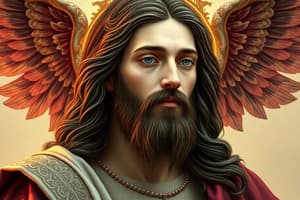Podcast
Questions and Answers
What event do Christians refer to that occurred three days after Jesus's death?
What event do Christians refer to that occurred three days after Jesus's death?
- The Last Supper
- The Ascension
- The Crucifixion
- The Resurrection (correct)
Paul originally supported the Christian faith before his conversion.
Paul originally supported the Christian faith before his conversion.
False (B)
Who was the Roman governor that ordered Jesus to be executed?
Who was the Roman governor that ordered Jesus to be executed?
Pontius Pilate
The Christians' refusal to worship the Roman gods and acknowledge the emperor as a god led to their ______.
The Christians' refusal to worship the Roman gods and acknowledge the emperor as a god led to their ______.
Match the following individuals to their significance in early Christianity:
Match the following individuals to their significance in early Christianity:
What was a major reason Christians were viewed as a threat to Roman society?
What was a major reason Christians were viewed as a threat to Roman society?
What form of execution was Jesus sentenced to?
What form of execution was Jesus sentenced to?
Christianity became the official religion of the Roman Empire by 380 C.E.
Christianity became the official religion of the Roman Empire by 380 C.E.
In what region was Christianity born?
In what region was Christianity born?
The emperor Constantine had a vision of a ____ hanging in the sky before a battle.
The emperor Constantine had a vision of a ____ hanging in the sky before a battle.
Match the following events with their descriptions:
Match the following events with their descriptions:
What did Constantine's soldiers carry into battle?
What did Constantine's soldiers carry into battle?
Judea was a region that remained independent under Roman rule.
Judea was a region that remained independent under Roman rule.
Who became a leader in the Christian faith after Constantine's conversion?
Who became a leader in the Christian faith after Constantine's conversion?
Many Romans viewed Christianity as a threat to Roman _____ and tradition.
Many Romans viewed Christianity as a threat to Roman _____ and tradition.
Who appointed Herod to be the king of Judea?
Who appointed Herod to be the king of Judea?
Herod was Jewish by birth.
Herod was Jewish by birth.
What significant event was ordered by the Roman emperor Augustus that affected Mary and Joseph?
What significant event was ordered by the Roman emperor Augustus that affected Mary and Joseph?
Jesus was born in ______.
Jesus was born in ______.
Match the following Gospels with their key themes:
Match the following Gospels with their key themes:
What did Jesus say were the two most important commandments?
What did Jesus say were the two most important commandments?
The parable of the Good Samaritan illustrates loving one’s neighbors.
The parable of the Good Samaritan illustrates loving one’s neighbors.
Where did Jesus grow up?
Where did Jesus grow up?
Jesus began preaching in Galilee and was identified as the ______.
Jesus began preaching in Galilee and was identified as the ______.
What was the main reason Judeans distrusted Herod?
What was the main reason Judeans distrusted Herod?
Flashcards
Origin of Christianity
Origin of Christianity
Christianity began with the life and teachings of Jesus Christ, who lived around 6 B.C.E. to 30 C.E.
Jesus's Death
Jesus's Death
Jesus was executed by crucifixion.
Constantine's Vision
Constantine's Vision
Constantine saw a vision of a cross and the words "In this sign, you will conquer".
Constantine's Conversion
Constantine's Conversion
Signup and view all the flashcards
Judea's Role
Judea's Role
Signup and view all the flashcards
Roman Rule in Judea
Roman Rule in Judea
Signup and view all the flashcards
Early Christianity's Challenges
Early Christianity's Challenges
Signup and view all the flashcards
Official Roman Religion
Official Roman Religion
Signup and view all the flashcards
Battle of Milvian Bridge
Battle of Milvian Bridge
Signup and view all the flashcards
Jesus's betrayal
Jesus's betrayal
Signup and view all the flashcards
Crucifixion of Jesus
Crucifixion of Jesus
Signup and view all the flashcards
Paul's conversion
Paul's conversion
Signup and view all the flashcards
Roman persecution of Christians
Roman persecution of Christians
Signup and view all the flashcards
Christianity's spread
Christianity's spread
Signup and view all the flashcards
Constantine's Edict of Milan
Constantine's Edict of Milan
Signup and view all the flashcards
Herod's Reign
Herod's Reign
Signup and view all the flashcards
Division of Herod's Kingdom
Division of Herod's Kingdom
Signup and view all the flashcards
Military Governor
Military Governor
Signup and view all the flashcards
Jewish Council
Jewish Council
Signup and view all the flashcards
Messiah
Messiah
Signup and view all the flashcards
Jesus's Teachings
Jesus's Teachings
Signup and view all the flashcards
Parable of the Good Samaritan
Parable of the Good Samaritan
Signup and view all the flashcards
Jesus's Disciples
Jesus's Disciples
Signup and view all the flashcards
Kingdom of God
Kingdom of God
Signup and view all the flashcards
Study Notes
Origins of Christianity
- Christianity originated from the life and teachings of Jesus Christ, believed to have lived from 6 B.C.E to 30 C.E.
- The New Testament describes Jesus's crucifixion, an execution method involving a cross.
- Early Christians believed Jesus was the Son of God.
Spread of Christianity
- Initially, Roman authorities viewed Christianity as a threat. Some emperors persecuted Christians.
- Emperor Constantine, after a vision of a cross, embraced Christianity. He credits the vision for his victory in the Battle of Milvian Bridge (312 C.E), and his conversion.
- His soldiers had the first two letters of “Christ” on their shields.
- Constantine favored Christianity and his mother was a leading figure in the faith.
- Christianity became the official religion of the Roman Empire in 380 C.E.
Judea: Birthplace of Christianity
- Christianity originated in Judea, an ancient territory at the eastern end of the Mediterranean Sea.
- In 63 B.C.E., Judea came under Roman control, with Roman appointed rulers, but the Jews frequently rebelled.
- Judea was sometimes ruled by Jewish kings, including Herod, who rebuilt the Temple.
- Despite occasional unrest, Judea was largely self-governed under Roman rule.
- Jewish people believed in a single God and had significant religious practices.
- Before the Roman Era Judea was once a kingdom ruled by King David and Solomon.
- Jews had prophecies about a savior (the Messiah) to restore the kingdom of David.
Birth of Jesus
- The exact date of Jesus's birth is unknown.
- Historians believe he was born around 6 B.C.E during King Herod's reign.
- Most information about Jesus comes from the New Testament (Christian Bible), specifically the Gospels.
- The Gospels of Matthew, Mark, Luke, and John detail Jesus's life and teachings.
- The Gospel of Luke details Jesus' birth in Bethlehem, to Mary, and her husband, Joseph.
- Luke also recounts the story of the Roman census as a reason why Jesus's parents traveled to Bethlehem.
- Jesus is said to have astonished the rabbis (teachers) in the temple at Jerusalem at the age of 12.
- Jesus began his public ministry around 30 years of age after John the Baptist announced him as the Messiah.
Life and Death of Jesus
- Jesus primarily preached in Galilee.
- He focused on love, mercy, and the importance of loving God and neighbor.
- He used parables, short stories, to teach.
- A famous parable is The Parable of the Good Samaritan.
- Jesus went to Jerusalem for Passover and was betrayed by one of his disciples, Judas.
- The Roman governor, Pontius Pilate, ordered Jesus's crucifixion.
- The Gospels describe his death on a cross, followed by his resurrection (3 days later) and ascension into heaven.
Missionary Work of Paul
- Paul was a crucial figure in spreading Christianity.
- Initially an opponent of Christianity, Paul had a profound religious conversion experience encountering Jesus in a vision on his travels to Damascus.
- Paul became a missionary, converting Gentiles (non-Jews).
- Paul stressed belief in Jesus as the Son of God and all people were God's children, emphasizing Jesus as the Messiah for everybody.
- Paul traveled extensively in the Roman Empire preaching and establishing churches.
- Paul wrote letters to other Christians.
- Paul died around 65 CE.
Spread of Christianity
- Early converts were mostly Jewish.
- Roman authorities became increasingly suspicious of the growing Christian community as its numbers increased.
- Christians faced persecution (crucifixions, burnings, being devoured by wild animals).
- Despite persecution, Christianity continued to grow.
- By 300 C.E., millions of Christians lived throughout the Roman Empire.
- In 313 C.E., Emperor Constantine issued the Edict of Milan, granting Christians freedom to practice openly.
- Later Emperors converted to Christianity, and Christianity became the official religion of the Roman Empire in 380 C.E.
Studying That Suits You
Use AI to generate personalized quizzes and flashcards to suit your learning preferences.




